United States: A new study has found that women who struggle with their mental health have an almost 50 percent higher risk of preterm births.
The research, published in the Lancet Psychiatry, analysed data from more than 2 million pregnancies in England and found that about one in 10 women who had used mental health services had a preterm birth.
The study further found a clear link between the severity of previous mental health difficulties and adverse outcomes at birth. It showed that women who had been admitted to a psychiatric hospital were almost twice as likely to have a preterm birth compared with women who had no previous contact with mental health services.

Additionally, women with a history of mental health difficulties faced a higher risk of giving birth to a baby that was small for its gestational age (75 per 1,000 births compared with 56 per 1,000 births).
The study suggests that when pregnant women are first assessed by doctors and midwives, they should be sensitively asked in detail about their mental health.
One of the report’s authors, Ms. Louise Howard, Professor Emerita in Women’s Mental Health at King’s College London, said such screening would help identify “clear red flags for a possible adverse outcome.”
“Mental illness is a treatable problem. Maternity professionals will be focused on thinking about other modifiable risk factors such as smoking and obesity, but they may not have thought about some of the additional risks that women with mental illness may have,’ Ms. Howard commented. According to the author, the study highlighted the need for well-resourced mental health services.

Ms. Howard, who chaired a committee that drew up the 2014 Nice guidelines on antenatal and postnatal mental health, noted that these guidelines should be updated in light of the study.
“The significance of the study is the association of adverse birth outcomes with the severity of illness. It also emphasises the need for really good training of midwives and obstetricians around mental health issues,” the author added.
The study did not explore the reasons behind the link between poor mental health and adverse birth outcomes.



